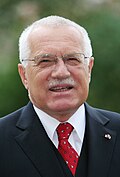This is a complete list of the presidents of the Chamber of Deputies (Czech Republic).
| Name | Portrait | Entered office | Left office | Political party | |
|---|---|---|---|---|---|
| 1 | Milan Uhde |  | 1 January 1993 | 6 June 1996 | ODS |
| 2 | Miloš Zeman |  | 27 June 1996 | 19 June 1998 | ČSSD |
| 3 | Václav Klaus |  | 17 July 1998 | 20 June 2002 | ODS |
| 4 | Lubomír Zaorálek |  | 11 July 2002 | 15 June 2006 | ČSSD |
| 5 | Miloslav Vlček |  | 14 August 2006 | 30 April 2010 | ČSSD |
| Vacant (30 April – 24 June 2010) | |||||
| 6 | Miroslava Němcová |  | 24 June 2010 | 28 August 2013 | ODS |
| Vacant (28 August – 27 November 2013) | |||||
| 7 | Jan Hamáček |  | 27 November 2013 | 26 October 2017 | ČSSD |
| 8 | Radek Vondráček |  | 22 November 2017 | 21 October 2021 | ANO |
| 9 | Markéta Pekarová Adamová |  | 10 November 2021 | 8 October 2025 | TOP 09 |
| 10 | Tomio Okamura |  | 5 November 2025 | Incumbent | SPD |